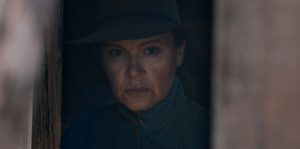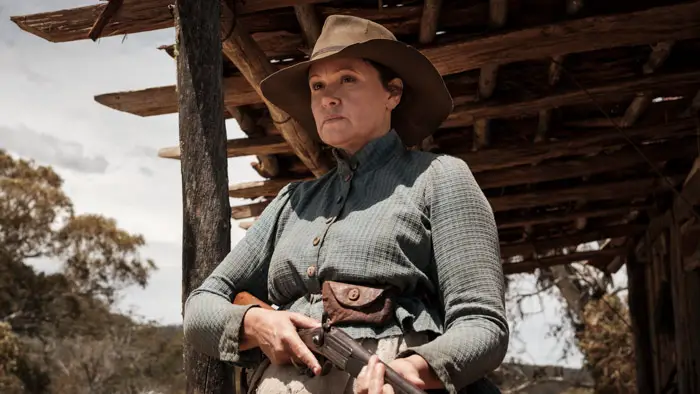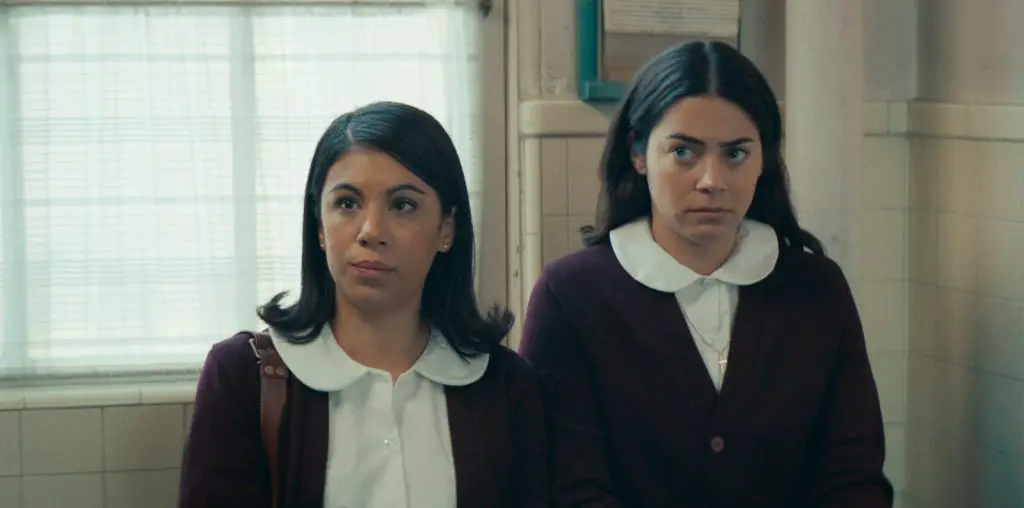
The Drover’s Wife presents beautiful images of the windswept hills of the outback. The landscapes are incredible and striking. Purcell conveys the stark isolation and the difficulty of life there with great clarity. This is the strongest aspect of the film. The performances are solid. Purcell has the character of Molly Johnson dialed in. However, the best acting comes from Rob Collins as Yadaka, who is compelling and utterly believable. A film that focused entirely on the relationship between Molly and Yadaka would be very satisfying. What we get, however, only spends a small fraction of the time on their interaction.
In fact, the story has a great deal of difficulty deciding what it’s about. In the nearly two hour runtime, we are presented with shifting themes, from Molly’s resilience in facing the rough life of the outback to the pretentious English attempt to tame a wild place, to the horrific racism baked into the culture, to the devaluation of women inherent in that society, to the meaning of justice in such a place. The changes in direction are head-spinning. All are worthy topics, but Purcell should have picked one, maybe two. Many of them have been dealt with in other films. John Hillcoat’s The Proposition, written by Nick Cave, for example, touches on oppression in Australia under English rule. Yet, for all that’s packed in, the film still has a pacing problem in that it drags in spots.
“...conveys the stark isolation and the difficulty of life [in the Australian wilderness] with great clarity.”
Purcell also touches upon the women’s movement in rural Australia in 1893. The police sergeant’s wife is campaigning for women’s rights and impressing upon him the need to consider the possibilities of justice for battered women. This is an excellent topic, to be sure, but it feels wildly out of place in this setting and does not smoothly fit into the other topics and plot threads being explored. (Editor’s note: After a decade-long civil rights movement, Australian Parliament passed the Constitutional Amendment, the Adult Suffrage Act, in 1894, making South Australia the very first electorate to give equal rights to men and women).
Australian filmmakers have been making incredible films for a long while, many of them centered on revealing unpleasant truths about their history. That these stories are getting more attention now is important. America has followed a similar narrative trajectory in dealing with our sordid past practices. It’s an exercise that informs and hopefully instructs us on a better way to live and respect others. The Drover’s Wife: The Legend of Molly Johnson is worth experiencing for that look at history. Leah Purcell as Molly Johnson gives us a strong, resourceful woman who can switch from mothering her kids to shooting a trespasser without missing a beat. She knows herself and won’t compromise her core values for any reason. Despite struggling with a thematic focus, the film presents a woman who is well worth getting to know.
The Drover’s Wife: The Legend of Molly Johnson screened at the 2021 SXSW Film Festival.

"…that these stories are getting more attention now is important."


